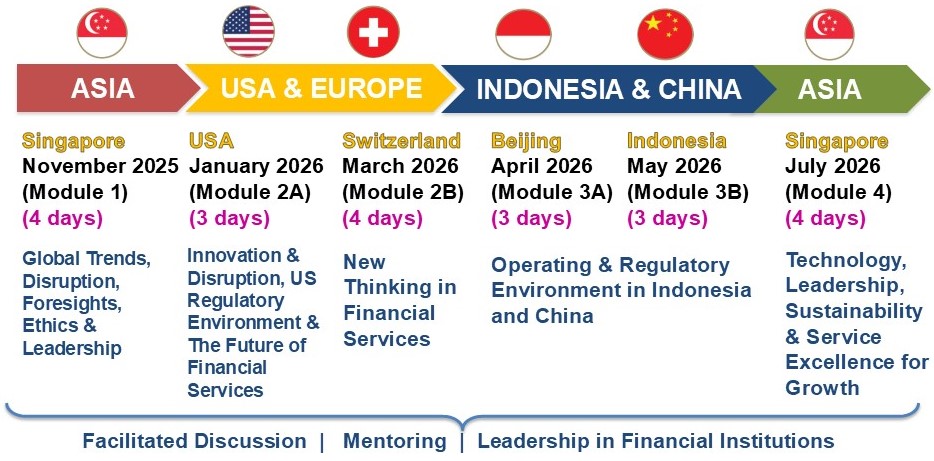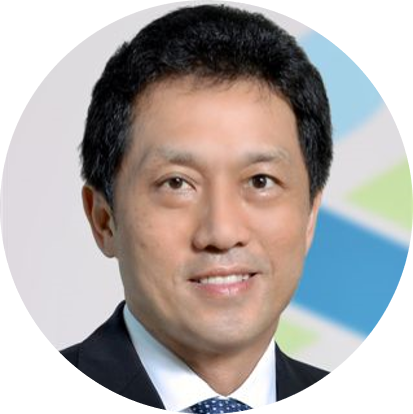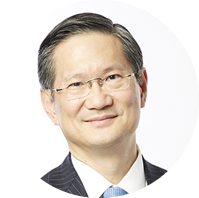PROGRAMME FEE
The programme fee payable is S$50,000 (before GST) per participant. Payment of the fee will be requested once the applicant is selected.
SUBSIDY
For Singapore citizens, who are employees of Financial Institutions and are sponsored by their organisations, applicants are eligible for a 50% subsidy from The Financial Sector Development Fund (FSDF). Financial Institutions will need to submit their applications to FSDF for funding at the point when their sponsored participants have successfully completed all modules of the programme.
TRAVEL & BOARDING
The programme fee exclude travel and boarding expenses. Participants will be responsible for their travel and boarding expenses, although the academic director may make certain recommendations to minimize commuting time between programme venue and the accommodation.
FIRST BATCH OF SENIOR-LEVEL FINANCIAL SECTOR TALENT GRADUATES FROM THE AFLP (29 SEPT 2016)
Temasek Management Services (TMS) Academy and Singapore Management University (SMU) today celebrated the graduation of the pioneer batch of 40 participants from the prestigious Asian Financial Leaders Programme (AFLP). The AFLP is regarded as the flagship programme for developing Asian financial leaders.
AFLP PRESS RELEASE
TMS Academy, the integrated leadership development arm of Temasek Management Services (TMS) and Singapore Management University (SMU) have been jointly awarded the mandate by the Monetary Authority of Singapore (MAS) to develop the Asian Financial Leaders Programme (AFLP).
DEPUTY PRIME MINISTER'S REFERENCE TO AFLP AT ABS DINNER
Keynote Address by Mr Tharman Shanmugaratnam, Deputy Prime Minister and Chairman, Monetary Authority of Singapore, at the Association of Banks in Singapore (ABS) Annual Dinner on 30 June 2015.
LOCAL TALENT TO THE FORE
Great Eastern Life Assurance Company Limited’s chief executive officer (Singapore), Khoo Kah Siang, noted that initiatives such as the Asian Financial Leaders Programme by SMU to groom locals for leadership positions in the financial industry, “are moves in the right direction and will provide much needed exposure across geographies through classroom learning, on-the-job training as well as industry visits”.
HENG SWEE KEAT: LOCAL FINANCIAL LEADERS MUST HAVE INTERNATIONAL CAPABILITIES TO SUCCEED
Jobs in the financial sector are becoming increasingly international-oriented. It is estimated that nearly half of the positions will be of an international nature. Local financial leaders must master international capabilities to succeed in this field and compete with talents from all over the world for leadership positions. Deputy Prime Minister and Coordinating Minister for Economic Policy Heng Swee Keat expressed these views when speaking at the graduation dinner of the Asian Financial Leadership Program on Tuesday (24 October 2023).
CALENDAR

MODULE DESCRIPTIONS
Module 1:
Global Trends, Disruption, Foresights, Ethics & Leadership

The first module gives participants a broad overview of the macro trends impacting financial institutions and services in Asia, and explains why leadership and strategic thinking are crucial to respond to the challenges ahead. The module sessions by industry experts will outline macro trends in patterns of economic development affecting Asian financial markets, regulatory changes, role of government, technology innovation with a special focus on China and the evolution of the new Asian consumer.
Financial sector leaders and leading academics will facilitate discussions on the strategic responses expected of leadership, governance of financial institutions, and how leaders should effectively execute their strategies and communicate across cultures in order to achieve the desired strategic outcomes for their institutions.
The first module offers a broad strategic framework that lays the foundation for more detailed discussions of specific professional aspects, management and markets in subsequent modules.
Module 2A:
Innovation & Disruption, US Regulatory Environment & The Future of Financial Services

The Module will continue to develop the theme of Expanding Horizons explored in the Asian and European modules. Much more is expected of today’s finance leaders than just mastery of finance and accounting fundamentals in the face of increasing cost pressures, shifting competitive landscapes, and higher regulatory scrutiny. In the volatile business world of today, successful finance leaders must now act as both strategic advisors and drivers of growth within their organisations.
Achieving profitable business growth increasingly is tied to these finance leaders understanding the global competitive landscape, current opportunities in financial services, future disruptions poised to transform the industry, executing successful growth strategies, and redefining risk and alternative investments for the future.
The faculty will lead highly interactive and engaging approaches in the programme including lectures, small group discussions, case-studies, networking opportunities, and learning-oriented visits to leading American financial institutions.
Module 2B:
New Thinking in Financial Services

The Europe Module aims to expand the participants’ global perspectives. Through a series of immersive experiences, using best-practice case studies and research from the faculty drawing on their experience of financial institutions around the world as well as visits to financial institutions, participants will be encouraged to formulate a coherent world-view that accommodates a vision for financial services twenty years from now.
They will be able to appreciate the magnitude of transformation programmes required to deal with enormously changed circumstances impacting the industry and have the opportunity to consider the imposing structural forces shaping our world, the much-evolved new needs of consumers and customers, the reach of government through its agent regulators and indeed bold new entrants with the attendant risks (including crime) and opportunities (for value creation) this brings.
Module 3A:
Operating & Regulatory Environment in China

China has recently leapfrogged ahead of Japan as the world’s second largest economy. However, with the recent slowdown in their economy, Chinese policymakers are contemplating structural reforms which portend significant risks for financial institutions operating in China as well as in Asia. This module identifies the key emerging trends of the Chinese economy, possible areas of restructuring and the underlying risks associated with shadow banking, non-performing loans to state enterprises, and asset bubbles. While the Chinese authorities have imposed macro-prudential measures to achieve a soft-landing for over-heated asset markets, their impact on financial markets have repercussions that need careful analysis. Country experts will discuss the impact of such measures and the likelihood of further measures to reign in asset bubbles. Another theme for discussion is the globalisation of the Chinese RMB. As financial markets become more globally connected, the likelihood of global and regional crises occurring has increased significantly. Developing an effective recovery and resolution framework allows banks to react quickly to crises and rescue profitable segments of business to ensure rapid restoration of confidence and reputation. The module ends with two roundtable discussions with Chinese financial institutions and regulators from Bank of China to get first-hand knowledge and appreciation of the risk and opportunities of operating in Chinese financial markets.
Module 3B:
Operating & Regulatory Environment in Indonesia

This module provides a comprehensive overview of the operating and regulatory environment of emerging Indonesia. A good understanding of the operating and regulatory environment is critical for financial institutions to operate profitably in financial markets. Experts will discuss the major trends developing in these markets and the associated operating risks. These risks are related to political dynamics, demography, religious tensions and transparency of regulatory frameworks. Participants will actively evaluate the magnitude of these risks and their likely impact on the financial sector. Although there are inherent risks, emerging markets provide tremendous opportunities for entry into new businesses, including infrastructure financing, Islamic finance and micro-finance. Roundtables with financial institutions and regulators will provide first-hand knowledge and appreciation of the risk and opportunities of entering these markets.
Module 4:
Technology, Leadership, Sustainability & Service Excellence for Growth

Module 4 focuses on how financial institutions can leverage on their internal capabilities to compete effectively and profitably in financial markets. These internal capabilities include service innovations, corporate branding, technology and leadership. In an intensely competitive environment, financial institutions can command a premium if they have the requisite branding for their products and services. Basel III and other global regulatory changes impose new challenges for liquidity and risk management. Effective asset-liability management provides financial institutions a strategic advantage in managing risk and pricing of financial products. This module also examines how technology can be leveraged to deliver superior products and services. Financial institutions can use data analytics to better customise solutions for customers, best-source to create cost advantage, exploit social media and digital media to better serve customers. The digital age also exacerbates the impact of cyber-security breaches. This module looks at scenarios where breaches can occur and how they can be mitigated. Ultimately, what enables financial institutions to adjust, adapt, respond quickly and appropriately to frequent changes in the environment is strong leadership. This module will also provide insights into corporate leadership and grooming talent for regional and global expansion.
To download the Asian Financial Leaders Programme brochure, kindly fill in the following information.
SMU respects the privacy of individuals and recognizes the importance of the personal data you have entrusted to us and believe that it is our responsibility to properly manage, protect, process and disclose your personal data. We will collect, use and disclose your personal data in accordance with the Personal Data Protection Act 2012. If you would like to find out more about Personal Data Protection Statement, please view our Privacy Statement at http://www.smu.edu.sg/privacy-statement.
An asterisk (*) denotes a required field.

Mr Wee Ee Cheong (Chairman)
Deputy Chairman and Chief Executive Officer
United Overseas Bank Limited (UOB)

Mr Lim Cheng Teck
Independent Non-Executive Deputy Chairman
RHB Banking Group

Ms Carolyn Neo
Chief Executive Officer
The Institute of Banking and Finance Singapore (IBF)

Mr Ronald Ong
Chairman, South East Asia
Morgan Stanley

Mr Chartsiri Sophonpanich
President
Bangkok Bank Public Company Limited

Ms Helen Wong
Group Chief Executive Officer
OCBC Bank